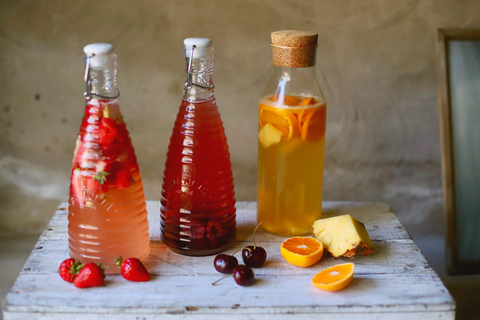HAPPY KOMBUCHA BLOG — Non-Dairy Culture
Why does water kefir/kombucha/ginger beer explode and how can i stop it?
blog ginger beer info kefir kefir receipes kombucha Non-Dairy Culture non-dairy kefir receipes Safety vegan culture water kefir

Fermented drinks such as water kefir and kombucha and ginger beer are fun and very easy to make and drink. The bacteria and yeast in the cultures converts the sugars into lactic acid, a very small amount of alcohol, and a lot of carbon dioxide. In some cases too much carbon dioxide, and as the drink continues to ferment, more and more gas is created. This gas creates pressure when it is sealed into a bottle and the more gas that is created the more pressure is created, and too much can cause problems.
What is a water sealed vegetable Crock?
blog fermented veggies Gut health info Kimchi Non-Dairy Culture Safety

Water-sealed crocks are a bit more difficult to find and usually more expensive , but they are generally pieces of art worthy of living on your kitchen counter.
After a water-sealed crock is packed, two half-circle weights are placed into the crock to keep your ferment submerged. Then, the lid is placed into an open moat which is then filled with water. Now, outside air is prevented from entering the crock and carbon dioxide gases created during fermentation easily bubble out. This helps to keep the environment inside the crock rich in carbon dioxide and this in turn helps to stop mold. Try to avoid opening the lid as much as you can though as otherwise you are letting fresh oxygen back inside!

Why did my water kefir explode?
blog info kefir kefir receipes Non-Dairy Culture non-dairy kefir receipes Safety

Fermented drinks such as water kefir and kombucha and ginger beer are fun and very easy to make and drink. The bacteria and yeast in the cultures converts the sugars into lactic acid, a very small amount of alcohol, and a lot of carbon dioxide. In some cases too much carbon dioxide, and as the drink continues to ferment, more and more gas is created. This gas creates pressure when it is sealed into a bottle and the more gas that is created the more pressure is created, and too much can cause problems. SO WHAT FACTORS AFFECT BOTTLED WATER...
Water Kefir Vs Milk Kefir- What is the difference?
blog Dairy milk kefir Gut health information kefir milk kefir Non-Dairy Culture non-dairy kefir non-dairy milk kefir vegan culture vegetarian water kefir

Kefir grains are very sustainable and economical. With gentle care, these grains can be recycled endless times. There are two varieties of kefir grains: water kefir which has a yellowish/clear crystal colour depending on the sugar they have been fed and milk kefir which has a white creamy cauliflower-type appearance. Both are delicious and have many health benefits. Kefir can be taken by all generations, from young to old, male and female. It is safe and nutritious. Since milk kefir grains feed on lactose, kefir is perfect for individuals who are colon sensitive and lactose intolerant. The good thing...
Using Rye Flour in Sourdough
blog bread breadmaking Culture care info Non-Dairy Culture Sourdough Vegan vegan culture vegetarian

The question we get asked the most about Sourdough is, do you have to use Rye Flour? The answer is no, you can use any kind of flour (although different flours will give different results) personally i recommend bread flour if you are not using Rye flour, however we would encourage you to give Rye a try. Why use Rye? Sourdough rye is an ancient food. Its rich, full flavour and deep colour is the basis of a large number of traditional breads. Today, modern wheat has displaced rye, making many beloved breads less common in bakeries and on our tables. Before cooking with rye flour,...
